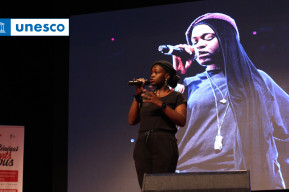News
The Gambia invests in the potential of its artists and cultural professionals

In the framework of the UNESCO-Aschberg programme and led by the National Centre for Arts and Culture (NCAC) of The Gambia, in cooperation with the UNESCO Regional Office for West Africa, The Gambia is receiving expert assistance to operationalize the National Endowment Fund for Arts and Culture to enhance the funding of artistic and cultural programmes. The project also aims to collect data on women artists and cultural professionals to guide policymaking aimed at improving their social and economic status, while raising awareness about incorporating women creatives, specifically their challenges and potential, in existing policy frameworks.
Addressing the challenges highlighted by the COVID-19 pandemic
Like in many countries across the world, the Gambian cultural and creative industries were significantly impacted by the COVID-19 pandemic. Lockdown measures impeded artists from continuing to work and perform, which had a dramatic impact on their ability to make a living. It is within this context that the NCAC organized a ResiliArt debate in May 2020 where participating artists highlighted an urgent need to establish a national fund for arts and culture that would enable artists to turn their creative ideas into concrete projects through the provision of initial funds.
Fast forward to November 2022, the NCAC launched a consultative process to discuss the establishment of this fund with local artists and cultural professionals, and with the expert support of Ms. Ojoma Ochai, a member of the EU/UNESCO Expert Facility from Nigeria.
Improving the status of Gambian women artists and cultural professionals
Another key component of the project will focus on improving the status of Gambian women artists and cultural professionals. In 2019, during the elaboration of the country’s quadrennial periodic report (QPR) on the implementation of the 2005 Convention on the Protection and Promotion of the Diversity of Cultural Expressions, a wide-ranging consultative process identified gender gaps in the cultural and creatives industries—lack of data on women in arts, low awareness of female artists on their rights as creators, and harassment of female artists online.

Ms. Yarri Kamara, another member of the EU/UNESCO Expert Facility from Sierra Leone, is supporting The Gambia in collecting data on the current condition of women artists and cultural professionals. An initial training workshop took place that involved enumerators, data entry clerks and supervisors in field survey to gather information from and about women creatives.
The Gambia is one of 12 Member States supported by the UNESCO-Aschberg programme in 2022, alongside Cabo Verde, Costa Rica, Indonesia, Madagascar, Mozambique, Palestine, Peru, Romania, Seychelles, Tunisia and Uganda. The UNESCO-Aschberg programme aims to support the design of new regulatory frameworks to protect and promote artistic freedom, including the status of artists and cultural professionals. UNESCO would like to thank the Kingdom of Norway for its generous support to the UNESCO-Aschberg programme, which makes this technical assistance possible.





